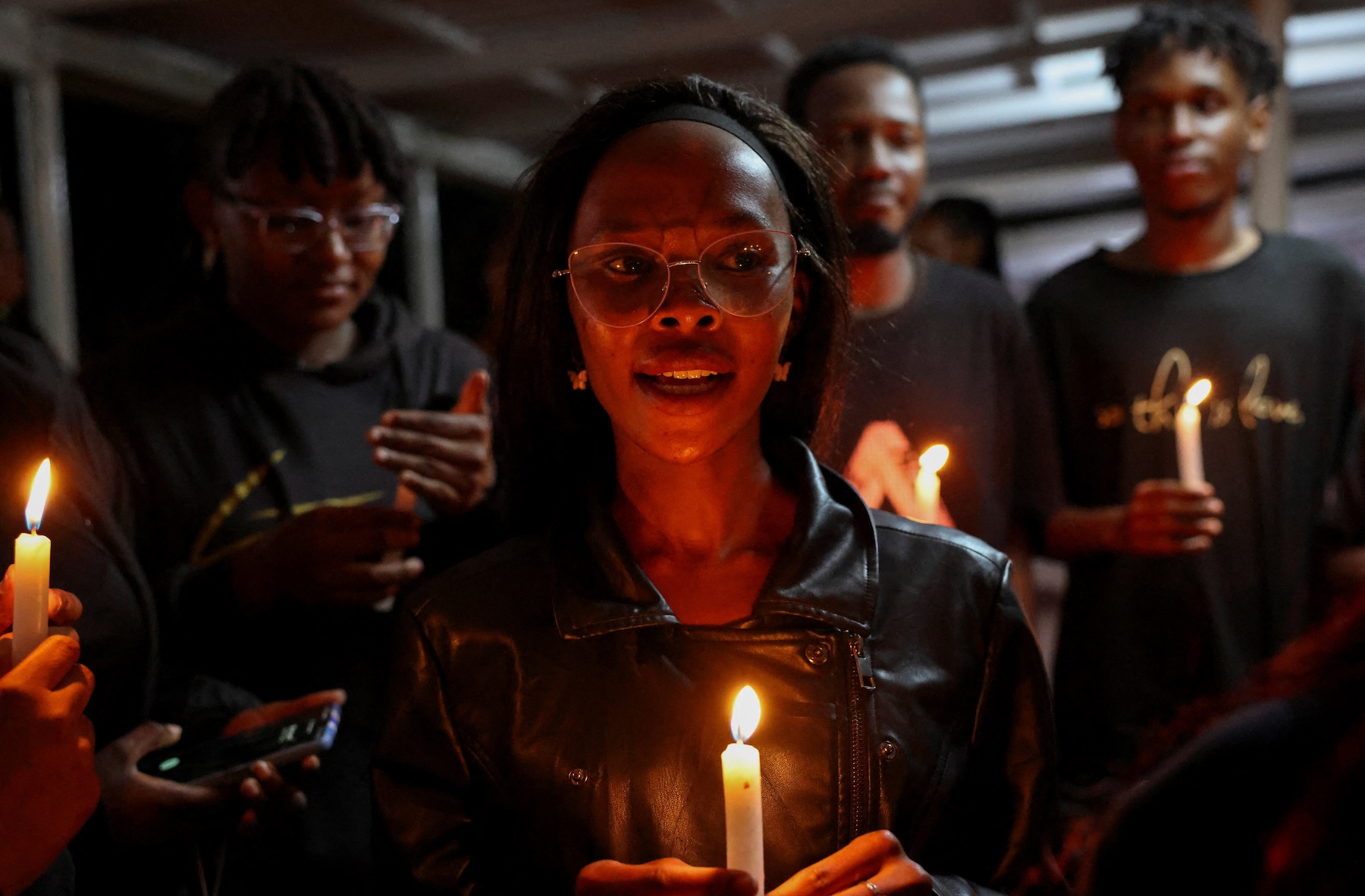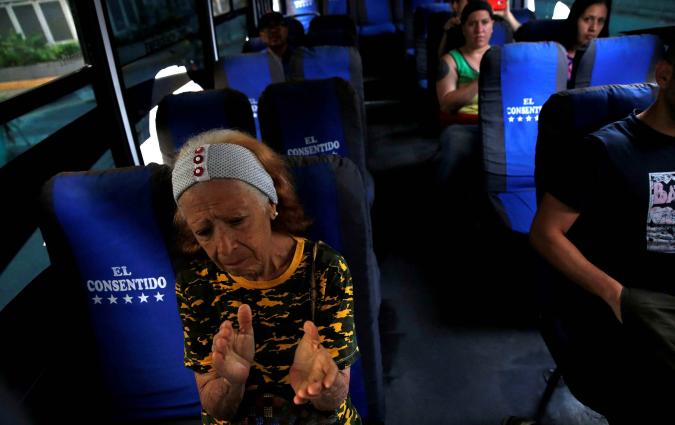“I felt powerless”: In Kenya’s newsrooms, young women face sexual harassment – and perpetrators often go unpunished

Activists and students participate in a vigil in Juja, Kenya, to raise awareness about gender-based violence and honour the lives of women lost to femicide in higher learning institutions in April 2025. REUTERS/Monicah Mwangi
Njoki Macharia was seated at her desk, working on a news script, when she overheard her editor make a crude sexual remark about her to a male colleague. “Na ni nani hukula Njoki huku?” he asked in Swahili slang, a lewd question aimed at finding out who, if anyone, in that newsroom was sleeping with her.
“I found it very disrespectful,” Macharia said. “It takes a mental toll on you.”
Such remarks were part of a “toxic environment” that left her questioning herself. Macharia, who worked at a local TV station from 2015 to 2020, says the incident taught her how quickly boundaries blur. “You learn early that to survive, you must navigate,” she said. “The industry teaches you what kind of woman wins, and what happens when you refuse to play along.”
A study published in 2023 by the Association of Media Women in Kenya (AMWIK), based on a survey of 240 journalists, academics and communicators, found that 60% of those surveyed have faced sexual harassment, with over 75% of harassment perpetrated by male editors and supervisors, individuals with direct control over women’s career progression.
“This report documents what women journalists have been whispering about in corridors for years: that Kenyan newsrooms were toxic,” said AMWIK executive director Queenter Mbori. She added that the findings suggest that sexual harassment is not just gossip or hearsay.
I wanted to explore the stories behind these numbers. So I spoke with three female journalists who’ve been harassed in Kenyan newsrooms and with two senior experts from AMWIK and the Kenya Editors Guild. The names marked with an asterisk* have been changed to protect individuals who spoke on condition of anonymity, fearing professional or personal reprisals.
A dangerous entry point
Those most vulnerable to harassment in Kenyan newsrooms are often the ones just starting. Junior staff and interns, many fresh out of university, are placed in high-pressure media environments with little support, few safeguards, and limited power. According to the AMWIK report, 42% of women surveyed said they were first harassed during their time as interns.
One of those interns is Grace*, who was excited when she landed an internship at one of Kenya’s leading newsrooms. Weeks before it ended, a senior editor approached her, hinting at a possible contract. “I was excited,” she said. But a few days later, that offer took a disturbing turn. The editor called her on a Friday, a day she wasn’t scheduled to work, and asked to meet at a popular nightclub in Nairobi.
“That was my first red flag,” she told me.
She made up an excuse and turned down the invitation. On Monday, he asked her to come to his office, and she went expecting a formal discussion about the contract. Instead, his intentions turned “totally sexual,” culminating in an attempt to grope her. “It made me feel horrible,” Grace said. “This guy wanted to touch my butt and my boobs.” She immediately shut it down and stormed out of his office.
The promised contract was never mentioned again. “It just died,” she said. “When he did reach out, it was only to keep pushing to meet, shamelessly.”
The editor was later laid off during company retrenchments, but soon joined another local TV station. His conduct was never publicly addressed.
Interns are especially at risk because of the power dynamics in newsrooms. According to AMWIK’s Mbori, many arrive eager to learn and inspired by the chance to work alongside well-known journalists. “They’re interacting with people they’ve only seen on TV,” she said. But that admiration, she noted, is often exploited. “Supervisors sometimes take advantage of the close working relationship to cross professional boundaries and abuse their authority.”
Mentorship with strings attached
In some newsrooms, mentorship from senior male colleagues comes with strings attached. Young women quickly learn that guidance may be less about nurturing talent and more about gaining access. “There’s something they call ‘initiation,’” said Macharia. “Senior editors line up to ‘mentor’ new girls, but only if they are their type. They pretend to teach them how to script or report stories. But the real goal is access.”
There’s something they call initiation. Senior editors line up to ‘mentor’ new girls, but only if they are their type. They pretend to teach them how to script or report stories. But the real goal is access
These risks aren’t confined to mainstream outlets. At a local Christian radio station, Hadassah*, another former intern, spent three months in what she now describes as survival mode. A senior colleague was supportive at first, offering to guide her through scripting and coaching her on voicing. But soon the tone shifted. “It started like he wanted to help me grow,” Hadassah said. “Then it became clear that it wasn’t about my work. I suffered all three months, especially when people weren’t around.”
As her supervisor, he would often assign her tasks that ensured they were alone, creating situations where he could harass her without witnesses.
In one incident, inside the boardroom, he started moving toward her and asked her to kiss him. She was holding a pair of scissors at the time and, trying to defuse the moment, said lightly, “Don’t do that, the scissors will cut you.” She quickly stepped around to the other side of the table and left the room. But a few days later, while she was working in the studio, he didn’t ask. He simply leaned in to kiss her. She turned her head to avoid him, but he went ahead and kissed her on the neck.
“It was so disgusting,” she said. “I felt powerless.”
This colleague tried to grope Hadassah on at least three other occasions and often made crude sexual comments about her. At one point, he told her it would all stop after her internship, as though it was part of the experience.
Hadassah developed a daily strategy to cope. She locked herself in the studio when working alone, made excuses to avoid being near him, and stayed close to others whenever she could. “It was very unsafe,” she said. “I had to find a survival tactic.” He still works at the same station and was promoted to overall editor a year after Hadassah left.
For journalism students like Grace and Hadassah, internships are more than just a foot in the door. They are a graduation requirement. But the same men who harassed them also controlled whether they would get the recommendation letter they needed to finish school.
This is why Hadassah avoided confrontation. Even after the internship ended, he delayed giving her the letter and kept pushing to meet. “I had to play smart,” she said. “I told him I was a bit busy and kept stalling because I needed that letter for my school.”
'You look so fuckable'
Beyond physical advances, many women described a relentless undercurrent of verbal harassment. It is the kind that hides behind smiles, laughter and newsroom banter. The AMWIK report found this to be the most common form of abuse, with 69% respondents reporting unwanted sexual comments, jokes or gestures. Though often dismissed as harmless, such remarks are deeply corrosive over time.
Grace experienced that culture firsthand. A producer and TV host she worked with often made sexually explicit comments in front of colleagues. One day, as they walked to lunch, he told her, “You look so fuckable.” The others laughed. “It made me so uncomfortable,” she said. “I thought someone would tell him to stop, but they just laughed.” Later, a colleague brushed it off by saying, “He’s just always like that.” She was told this as well when she mentioned the incident to a senior editor.
Macharia knows all too well what happens when a woman refuses to play along. She kept her distance from male colleagues and avoided flirtation, a stance that quickly made her a target.
“I was not the type to entertain men in the newsroom,” she said. “That rubbed people the wrong way.” Soon, she was labeled “too hard to approach” or told she had a “resting bitch face.” Editors who once praised her work began nitpicking her scripts while colleagues who were seen as more “friendly” were handed plum assignments.
She recalls comments like “You’d be more approachable if you smiled more” or “Why are you so serious?” If she pushed back, the response was always the same: “Can’t you take a joke?” In the newsroom, she said, professionalism was too often interpreted as a lack of submission.
A culture of silence
Kenya’s laws, including the Sexual Offences Act and Employment Act, offer protections on paper, but AMWIK’s report found 70% of those surveyed were unaware of any newsroom policies, leading to widespread underreporting of these issues. Many women choose to remain silent, thinking the system is unlikely to protect them against wrongdoing.
However, silence is not just a matter of personal hesitation. It is shaped by an entrenched newsroom culture that normalises abuse and discourages dissent. “Many young journalists stay silent not because they want to, but because the system offers them no protection,” said Zubeida Kananu, President of the Kenya Editors’ Guild. Fear of retaliation, public shaming or being labelled “difficult” keeps many quiet.
Both Hadassah and Grace took different approaches to reporting. Grace confided in a colleague and was told the perpetrator “is known for that.” Hadassah feared jeopardising her internship. When the internship ended, the station invited her back, and she declined. She cut off contact with the editor and never told anyone about the harassment: not colleagues, not friends, not even her mother.
Years passed, and she left journalism, but she has often thought about her silence. “These are things we need to speak about,” she said. “We stop future harassment when we speak out publicly. Silence empowers predators to continue and creates more victims.”
These are things we need to speak about. We stop future harassment when we speak out publicly. Silence empowers predators to continue and creates more victims
Even when women do report harassment, the system rarely protects them. Human resource departments often demand proof for incidents nearly impossible to document. “How do you prove a whispered ‘Come to my office alone’?” Kananu asked.
Almost half of the respondents in the AMWIK study said they were unaware of safe channels for reporting harassment. And even when cases are reported, justice is elusive. “Women get moved to lesser beats after reporting [these incidents],” she said. “The harassers? They keep their jobs.”
The cost of speaking up
Of the 240 professionals surveyed by AMWIK, 75% knew who the perpetrators were, but no disciplinary action was taken in most cases. Those who reported harassment often faced retaliation or were quietly removed from key assignments.
In newsrooms where policies exist, they are often poorly enforced, vaguely written, or inaccessible to junior staff, leaving survivors without recourse. This was the challenge Macharia faced when she tried to report abuse. “I was told to put my complaint in writing and wait for it to go up the chain,” she said. “This was the same chain run by the people harassing us. So I gave up.”
Mbori said many journalists do not even know what qualifies as harassment: “They’re harassing colleagues and they don’t even know they’re harassing colleagues. On the other hand, [some of] the people who are being harassed don’t even know they’re being harassed.”
This lack of awareness, combined with normalised newsroom cultures and weak accountability, reinforces silence. “So we are repurposing this vice at a deeper level,” she said, “because there is no accountability mechanism that has been put in place.” Mbori urged news organisations to do more than adopt anti-harassment policies. They must implement them, train staff, and establish survivor-centred reporting systems. “Sexual harassment is a power play issue,” she said.
Online abuse is pushing women out
The threats women journalists face are not confined to physical newsrooms. Kananu warned that online harassment has become another powerful tool for silencing female reporters. “They attack your looks, your family, even your children just for doing your job,” she said.
After posting critical stories, women are often met not with debate but with demeaning insults. “They post personal stuff about your life like photos of your children. Even my number was shared online,” she said.
Some women have chosen to leave social media altogether to protect their mental health. “They’re choosing between safety and visibility. That’s not freedom. It’s surrender,” Kananu said. She added that this constant online abuse is part of a broader effort to push women out of public discourse. “These trolls know exactly what they’re doing,” she said.
How to create a healthier culture
In 2021, AMWIK partnered with Journalists for Human Rights to develop a model sexual harassment policy for newsrooms. It includes definitions of misconduct, confidential reporting structures, and protections against retaliation. At the time of this writing, 12 outlets had adopted it, but implementation remains uneven.
“Without a policy, it becomes very difficult to tackle this menace,” Mbori said. Even where policies exist, she added, they often sit unnoticed in HR with no training or awareness. “It’s just a document to tick boxes.” AMWIK is pushing for zero tolerance with active enforcement, staff training, and policies that go beyond lip service.
We’re not asking for special treatment. We just want to do our jobs without being reduced to bodies. We want respect. We want dignity. That’s all
Kananu echoed that call and stressed that newsroom reform is not just a gender issue but a journalistic one. “Newsrooms should model the accountability they demand of others,” she said. “If we can’t protect our own, how can we claim to protect the public?”
Kananu said that the Editors’ Guild is pushing for stronger, enforceable protections across the industry. “We’re working on a mandatory sexual harassment policy for all member newsrooms,” she said. “These won’t be optional guidelines. They’ll be enforceable standards.” That means not just having policies, but implementing them through regular training, clear reporting structures, and real consequences.
The Guild also plans to take disciplinary action against offenders. “We will blacklist editors convicted of harassment,” she said. “No more quietly moving them to another station.”
Newsroom accountability must extend beyond internal policies to legal enforcement, Kananu said. The Guild is looking to collaborate with the police GBV Unit to ensure that harassment cases are properly investigated.
“If a journalist files a police report, newsrooms must not interfere,” she said. “Too often, managers call victims to ‘settle it internally.’ That ends now.” Police, she added, must treat harassment in newsrooms like any other crime, with no special treatment for so-called media stars.
The women giving up on journalism
For Macharia, healing has taken time. She eventually left the newsroom, but the impact of those early years remains. “It’s not just what was said or done,” she said. “It’s that it made me feel like I didn’t belong unless I played by their rules.”
Today, she works as an independent journalist and mentors younger women trying to find their footing in the industry. “We’re not asking for special treatment,” she said. “We just want to do our jobs without being reduced to bodies. We want respect. We want dignity. That’s all.”
For Hadassah and Grace, the internship experience was deeply discouraging. Today, Hadassah works in healthcare and Grace, as a data analyst. Both chose paths outside journalism.
Back on campus after internship, one of Grace’s professors asked if she still wanted to work in a newsroom. “I said no,” she recalled. “Before the internship I was passionate. When I came back, the fire was gone.” Her answer surprised the room, but for Grace, it felt like a quiet form of self-preservation. “If the people ahead of me say this is how it works, what chance do I have?” she said.
In every email we send you'll find original reporting, evidence-based insights, online seminars and readings curated from 100s of sources - all in 5 minutes.
- Twice a week
- More than 20,000 people receive it
- Unsubscribe any time







